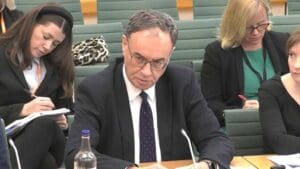
The Governor of the Bank of England, Andrew Bailey, has cautioned that the recent increase in employers’ National Insurance contributions could create uncertainty over future interest rate cuts.
Addressing MPs on the Treasury Select Committee, Bailey noted that while inflation has been falling faster than anticipated—prompting the Monetary Policy Committee (MPC) to reduce interest rates to 4.75% earlier this month—the hike in employer taxes announced in last month’s Budget represents “one of the biggest uncertainties ahead”.
Bailey explained that if higher employment costs lead to job cuts, it could soften the labour market, necessitating a more gradual approach to lowering interest rates. “There are different ways in which the increase in employers’ National Insurance contributions announced in the Autumn Budget could play out in the economy,” he said. “A gradual approach to removing monetary policy restraint will help us to observe how this plays out, along with other risks to the inflation outlook.”
His comments come amid mounting concern from the business community. Over 70 major retailers—including Tesco, Marks & Spencer, Sainsbury’s, Asda, and Next—have written to Chancellor Rachel Reeves, warning that the “sheer scale” of new costs will make job losses “inevitable”. Economists predict that up to 100,000 jobs could be lost over the next five years due to the increased financial burden on businesses.
Bailey also highlighted that inflation within the UK’s services sector remains excessively high and is “incompatible” with the Bank’s target of bringing overall inflation back to 2%. Official figures due to be released tomorrow are expected to show a rise in the Consumer Price Index (CPI) to 2.1% in October, driven by increasing household energy bills.
Market traders are now adjusting their expectations, with many not anticipating another reduction in interest rates until early next year.
Read more:
Bailey warns employer tax hikes may delay interest rate cuts





